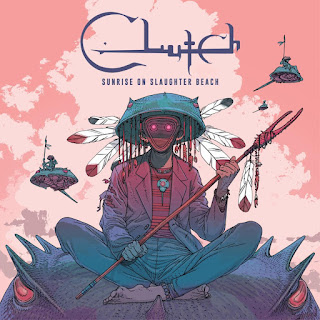The pandemic took something from all of us; in the case of Clutch, one of hard rock's most dependable and hard working bands, it took the crucial lifeline that is touring. What this essentially means for their thirteenth album is that its creation wasn't able to be informed by their normal practice of road testing and fine tuning the songs. Written and recorded in the tentative times surrounding lockdowns, mandates and sporadic performances (including a handful of well-received Live from the Doom Saloon livestreams), Sunrise on Slaughter Beach is, in turn, somewhat of a tentative album by the longstanding champions of pure rock fury.
In a way, this album is a welcome retraction from previous record Book of Bad Decisions, which is sprawling by comparison at fifteen tracks over 57 minutes. With nine tracks over 33 minutes, Sunrise on Slaughter Beach isn't just a leaner record, it's the shortest of their storied career by far; this implies a focus on quality over quantity, which is likely the smartest move given the inability to vet these songs in front of crowds of rapturous focus groups.
However, the lead singles signaled the possibility that Clutch were perhaps getting a little too snug in their comfort zone; Red Alert (Boss Metal Zone) and We Strive for Excellence are certainly good enough songs and don't want for energy considering this band has been going for over thirty years now, they just feel more or less like songs you would expect Clutch to pull out of thin air on a whim, the kind of hard charging boogie rockers that they've been so good at for so long it's sometimes difficult to acknowledge that they've probably done it all better before (for example by comparison, X-Ray Visions and Crucial Velocity). Pseudo title track Slaughter Beach was more interesting, offering a slower and more melodic groove with a short psychedelic breakdown that proved they weren't content to simply do the same old same old despite not fully committing to breaking new ground.
So, how does the other two thirds of the album fare? Remarkably well, which may or may not surprise you depending on your level of familiarity with Clutch's albums; there's a leaner, more nocturnal slant to much of this record, a side step from the southern fried boogie rock that had become as much a calling card as Neil Fallon's ageless howl. This is felt most effectively on the majestically propulsive fantasy rocker Mountain of Bone and the electric, manic groove of Three Golden Horns (which pivots into a brief, classic half-time breakdown just to tease old school fans). There are also plenty of moments for the rhythm section of Jean-Paul Gaster and Dan Maines to shine, especially when you hear them gradually take command of the strutting moonlit anthem Nosferatu Madre and the richly textured pit-starter Skeletons of Mars; their steady playing remains key to what sets Clutch apart from the pack, and there's no lost momentum there due to age or any other would-be diminishing factor.
Just as when they last went back to basics on Earth Rocker nearly a decade ago, the focus on achieving higher energy on record makes the slower moments hit even harder. Album closer Jackhammer Our Names trudges along a sparse, eerie instrumental as Fallon illustrates a victory lap in the way only he and his 20-sided die can. It's a pleasant enough ending, although it's eclipsed handily by the album's other slower track; acting as the album's literal centerpiece, Mercy Brown borrows a little of the sinister black magic from ...Like Clockwork era Queens of the Stone Age and injects it with that unmistakable Clutch flair. This is one of the most unexpectedly transcendent moments they've ever created, even more so as it hurdles toward its conclusion atop a stunning, ghostly backing vocal that somewhat recalls Pink Floyd's The Great Gig in the Sky (not to say this is as good, because there isn't much that is, but...).
Having said all of that, while it's certainly impressive in all of the ways that one would expect a Clutch record to be (they get to hang on to their title as rock's most dependable band for the foreseeable future and perhaps for all time), Sunrise on Slaughter Beach does feel like a step ever so slightly back; it's still a great addition to their stellar catalogue, but I admit that much of the record feels relatively safe by Clutch standards. Of course, I consider Clutch to be well past the point of having anything to prove, and their previous dozen records are each proof of their dominance through the decades, but this is the first time I've listened to a Clutch album and wished they'd taken some of their ideas a bit further. They are still testing uncharted waters (such as on Mercy Brown and Skeletons of Mars), but here they've more often opted for the path of least resistance.
Still, this is Clutch we're talking about and, as such, even their missteps are better than most of the music being made by their peers; I can forgive a band wanting to reconnect with their past and aiming for the most distilled, economical version of that reconnection, especially when those moments wrap around you like a nice, warm blanket and they still find the time to throw in a few surprises. The way I see it, they have have worked harder than most and created one of the most exemplary discographies rock and roll has ever seen; if anyone's earned a victory lap, it's Clutch.
September 16, 2022 • Weathermaker
Highlights Slaughter Beach • Mountain of Bone • Mercy Brown


Comments
Post a Comment